The deprogrammer
Survival skills teacher Zach Fisher feels like we’ve all just been on a collective vision quest and come out the other end ready to connect. The good news is, we still have the instincts we need to live as part of nature. We just have to learn to listen to them.
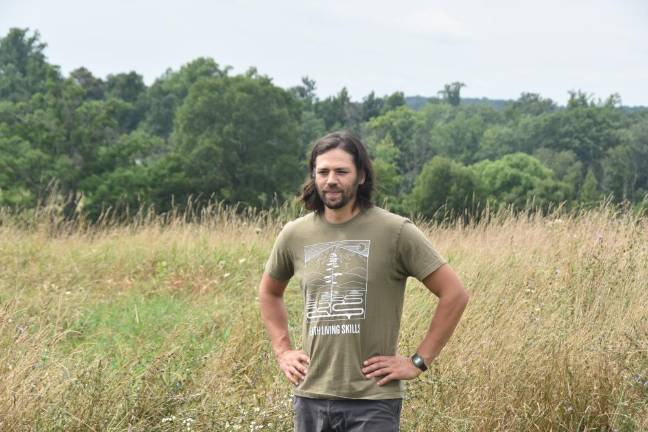
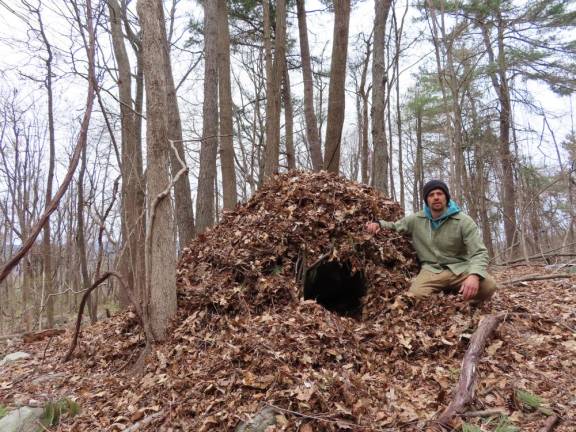
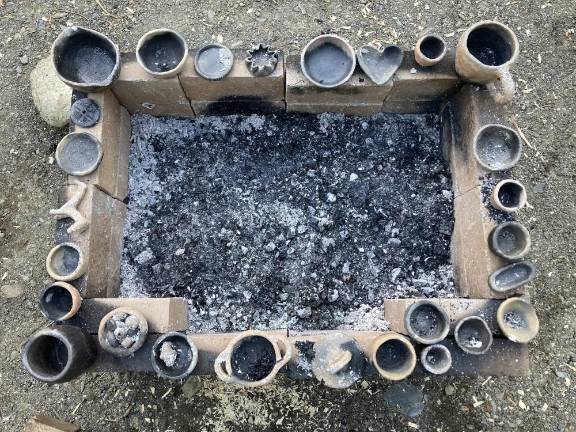
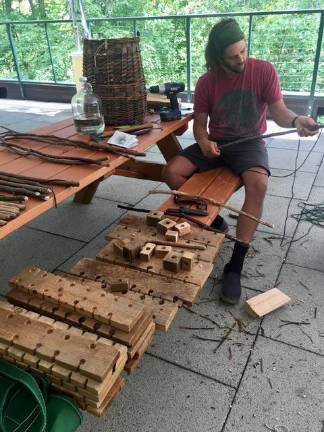
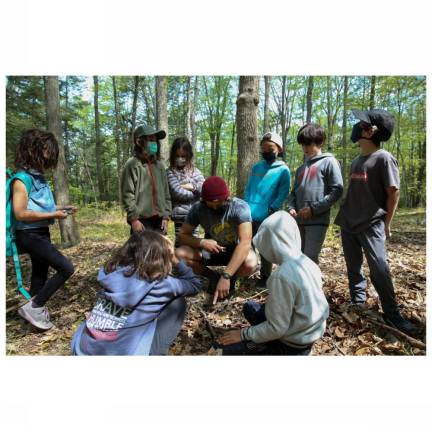
I brought you cherry tomatoes, because sometimes wilderness folks are so busy they don’t actually get around to gardening.
I do not. I’m not a good gardener. I guess it is I’m probably just too busy, but I just also don’t know what I’m doing. I allow plants to do what they want to do, then I harvest them. I identify them and I harvest what I need. I just learn what’s growing wild and I eat that.
You’re from California. What brought you east?
I’m a musician and an artist, and it was kind of like San Francisco was a little too slow – lots of talk, not a lot of action. I think the weather’s too nice. When days are like this, every day, you’re just like ahhhh. New York has a lot more mystique. And the seasons, I was always drawn to the seasons.
How’d you get from the artist’s life to survival skills?
My younger brother, he started taking classes at a school in south Jersey, the Tom Brown Jr. Tracker School. I was kind of peripherally observing it, just from being around it. When I moved out here, he was like you should take a class. I did, and it was a big life-changing moment.
Tell us about that first class you took.
So the first class you have to take is called the Standard. It kind of just gives you a foundational introduction to survival mentality from the perspective of indigenous people, indigenous technology, kind of a universal approach to it. You know, methods that work everywhere: how to build a shelter, how to start a fire, how to cook on the fire, how to purify water and how to find it, how to track. He gets into the philosophy part of it as well, kind of the spiritual side of it.
Do you remember the moment you got hooked?
Friction fire is a very arduous way of making a fire when we have Bic lighters and things. But the feeling I got after working on it – you know, you have to carve your own kit, and you have to learn how to use it and the form is very specific. It’s a lot of work, especially when you’re basically figuring it out on your own. They kind of show you but there’s 100-something people trying to learn this thing at the same time. So they kind of let you suffer your way through it. It took me about two and a half days. Every time I had a chance in between lectures and exercises, we were trying it. I finally got it. When it first burst into flames in my hand, I felt the same thing happen in my chest. Something changed. And I was like yeah, I’m going to do this for the rest of my life. And I will, because it’s never-ending. There’s always just more and more.
Have you gone on any epic solo trips?
I did a traditional vision quest. A Lakota Hanbleceya, which translates to “crying for a vision.” I sat out on a blanket for four days. Didn’t eat or drink anything. You weren’t supposed to sleep but that was impossible – totally impossible. The dust kind of settled from my mind and I could see clearly. And that’s why I say everyone’s on their collective vision quest right now. I know that hasn’t been everyone’s experience during the pandemic, but for a lot of people there’s not that constant motion. And everybody had to sit still and be, quietly. For a long time.
The result of that was that I was supposed to share that experience with as many people as possible. It wasn’t a moose that came out of the sky and gave me the vision. It was much more subtle. It was beautiful. I can still go back there.
Fast forward to today. You teach survival skills for a living, and live near here, in Cornwall... Indoors?
Yep, indoors. I try to make my indoors situation feel as outdoorsy as possible, sleeping with all the windows and doors open, try to be outside as much as possible. But yeah, a little standalone cottage on 60 acres, walking distance from a state park which is really just ideal. My basement is filled with skins and rocks and sticks.
I would love to see that.
Not right now. It’s chaos down there right now.
You and two friends from Tracker School have a cooperative called Earth Living Skills. Talk about the teaching you’ve been doing.
We’ve been doing these private homeschooler groups, you know like once a week for six to eight weeks, meeting the in Harriman State Park, teaching them plant and animal identification, archery, play games, work on friction fire, how to use a knife, that kind of stuff.
It’s a mix: you gotta make it fun for them but you also have to make it educational. A lot of the time you’re playing games, but all the games have, usually an awareness element to them, which is a major part of all this – just getting people to pay attention. Doesn’t come naturally. Well it does, and then it’s programmed out of us.
We’ve been doing some adult programs. We did a basketry workshop, primitive pottery, animal processing, basic herbalism and medicine making.
Can you give an example of a game you play?
One of my favorites, there’s a bunch of different names for it, but it’s called Firekeeper. Somebody is blindfolded, and they’re sitting in the middle of a circle. Everybody else is circled around them. I have a collection of little bells, set in a circle around them. I’ll choose people in the circle and they have to try to sneak in using a technique called fox walking; they try to sneak in and steal a bell without getting caught. The person in the middle can clap their hands and point, and try to point out where people are -- using their ears, but also learning to train the instinct. When you feel like someone’s close to you, go with that. Don’t go necessarily go on just hearing, just seeing, any of that. Go with what your gut is telling you. Trust that. We really try to get people to lean into that. I’ve seen some really magical things, miraculous-seeming things, happen when people just trust that. And especially with kids they’re so in tune to it anyway, before they start to overthink things.
It’s a game that people are like – whoa, how is that possible? You’ll have someone in there that’s never done this before, and they’re just picking out people left and right. They’re like what? I wasn’t even making a sound, how did they know? I live for those moments, when people are like, wait a minute. That’s an empowering feeling to be like, Oh, I have this inner language that I’m not used to listening to. It’s hard to understand, and so I feel like when people try to find the logic in it, it kind of disappears. It is something that you just have to trust. There’s no sense to be made of it.
I think that applies to a lot of life – you overthink it and it stops working.
Personally, that’s been a lot of my work this last couple years especially: undoing the overthinking, the over-analyzing, the over-critiquing, and just like, what does my instinct say? I’m going to go with that. I can’t think of a time that it’s led me astray. But it does take a lot of unprogramming: I’m going to go ahead and trust this feeling.
I don’t think we’re taught to trust feelings so much in our modern society. I talk a lot about: if I were a squirrel, that feeling would be 100 percent on all the time, because if not I’d get eaten by some giant bird that flies out of the sky and yanks me right out of the branches; I’m a meal. I like to have people watch animals a lot. I make people do sit spots a lot, which is just sitting quietly and observing, blending into the landscape if they can, just watching what happens when they’re part of it, when they just become a tree.
Have you noticed an increase in interest in survival skills recently?
Definitely. Through this whole pandemic, people have been so isolated that it’s been almost a collective vision quest. It’s been a collective inward journey for everybody where all this stuff comes up. Everybody’s like: what am I doing with my life? Do I want to be with my partner? Do I want to be doing this job? It’s just like everything was wiped clean, and everybody’s just alone and just trying to figure it out. And I’ve found that people are showing up to programs just so ready to connect.
You want to be connected to nature? This is a way, this has been the way for as long as human beings have existed. You learn how to process your own meat. You learn how to identify plants and turn them into medicine. You learn how to track animals and understand what’s going on in the landscape. You learn birdcalls, so when you finally go out there you can just be walking through the woods with almost nothing and just be like, yeah, I’m home. This feels like home.
The more time, the more experience you have out there, the more it feels like somewhere you can be comfortable. You take kids from the Bronx into a city park and they’re like ew, bugs! You start there and you get all the way to where you’re sleeping in a pile of leaves for a week.
Is there a tension, being a white guy (I assume) teaching indigenous skills?
Yeah, white-ish. My mom’s from South America but I do display as white. Because this is my livelihood I think about it a lot. In the end this type of relationship with nature is a birthright for everybody. These skills come from living in nature, from being a human being with a human mind, figuring it out, creating technology. The lineage that I learned from comes from Tom and his teacher was a Lipan Apache elder, and he spent his time walking around North America basically, learning from different tribes and healers and hunters and people, and just acquiring knowledge. His choice was to teach it to these two white kids from New Jersey, one of which was his grandson. But Tom’s this straight-up white guy. I pay homage to it. Certain skills are universal: all people come from a lineage that use stone tools, that use friction fire, that made clay vessels, that made leather, that hunted, that tracked. That’s universal. Now there are certain specific technologies that come from specific tribes or cultures or areas of the world, where the resources that they had created the technology they used.
Out west, the stone they used for flint knapping was far superior to the stone they use here. People were just trying to survive, and everybody was trying to survive all over the world. I think there is a tendency for people who have done no research into this to say, well, these are Native American skills. Well yeah, in this area a lot of what we study is coming from Native Americans. But I’m not singing Lakota songs at my program, I’m not wearing the sacred colors. I’m not talking about their culture, that’s not my culture.
If I was going to sing a song or incorporate this specific thing, I would go find somebody and I would ask. I find a lot of people are throwing cultural appropriation out there – you’re rubbing sticks together to make fire, that’s cultural appropriation. Well you obviously have no idea what you’re talking about, because appropriated from where? These are skills that come from going out in nature, just trying to sustain yourself. Well, I’m going to need a fire, so I’m going to rub these sticks together.
I also volunteer my time, teaching classes. I’ve worked with the American Community House in New York for a bit. We’ve given out some BIPOC scholarships because I do want to support more of those cultures in the outdoors, especially cultures that have traditionally been oppressed. This is a very empowering experience so I like to be able to deliver that. I’m just trying to give everybody the experience. Really I’m out there for nature. I want people to understand nature, I went them to value it so they stop destroying. A lot of the white guilt and the cultural appropriation stuff, I think it’s important conversations to have as long as people’s egos don’t become so involved in it. We got limited time here guys, we need to be educating as many people about this as possible, so that people start to understand what nature is and how we are connected to it. That’s my vision. That’s all I really care about. Otherwise we’re just going to be shouting into the echo chamber while the world burns.
I was going to start teaching with the Institute for American Indian Studies in Connecticut but you have to be approved by the board unless you’re Native. So it’s hard to access. There is a big wall there. I’ve done plenty of research on the kind of trauma – complete, entire tribes just obliterated, gone. There’s a big wall that’s hard to get across.
You mentioned you’re rethinking the language around what you do. Talk a bit more about that.
There’s kind of a rebranding effort it seems, when talking about survival skills or primitive technology, especially. The word primitive, I’ve heard some people who are still part of the Native lifeways here, are like well it’s not primitive. We still use these skills. We’re not primitive people, we’re modern day people who still practice this stuff.
So instead of primitive skills, what might you call it?Advanced nature skills. Ancient lifeways, I’ve heard. Earth Living Skills, that’s the name of our company, it kind of has more of a modern context. My initial reaction to those kinds of things is just like come on guys. There’s so much terminology, just being thrown into the general zeitgeist – everything, I feel like there’s new terms for everything all the time. Which I think is necessary. There’s an adaptation that needs to constantly be – things dying, things growing, things being renamed, changed, that is the essence of survival: if you don’t adapt, you die. But it’s so hard to keep track of.
It’s like look, I’m just trying to get kids to be in nature and appreciate it, so when they get older they don’t just destroy it. So they give a sh**. That’s all I’m trying to do. Okay, you want to call it something else, let’s call it something else, but I don’t really know what else to call it besides primitive technology because that’s what it is. Primitive just refers to came before now, and technology is what it is, the first technology.
It does feel sometimes like a waste of time. This is all fine and great, but there’s a real issue over here: a daily growing chasm between what wilderness is and what humans are. It used to be one and the same, and now we’re two separate things in total conflict with each other. I’m like, let’s focus on that. Call it what you want. At the same time I try to be really sensitive about those issues because I know how much trauma is wrapped up in it.
Do people come to you with a similarity of purpose? Like, they’re hardcore survivalists or they want to lose weight or their mom said they’re playing too many video games?
Yes. And that’s the beautiful l thing about it, and more evidence to me that it’s universal is yeah, I get everybody. I get ex-military hunters, I get hippie grandmothers, I get lawyers from New York, I get hipsters, I get everything.
Everybody has a connection to this stuff, everybody has a baseline interest in it. It depends on the class: a class on herbalism is going to attract a different overall crowd than a class on animal processing but there’s going to be some crossover there. But I’d say overall, it’s to have that deeper thing that happens when you just sit in nature for awhile, or when you understand it a little better. For me personally, the better I understand it the better I understand myself, and just people in general.
I kind of consider myself somebody who introduces somebody else to their teacher. From the very beginning, I started developing a relationship with fire: fire tending, building, how to use it, more as like an entity than just a thing. I consider it a teacher, I consider it an elder, and so I treat it that way. Then I introduce my teacher to somebody else, like hey, Sally, this is fire, you guys now can build your own relationship. It just happens naturally. People were built to live in nature. We have the same minds, we have the same bodies, we have the same everything, it’s just a different context now.
Do we have the same everything? We haven’t devolved a little?
Probably. There’s always something, little things changing here and there, but I think we have the same mind. We have that same instinct. Those things are built into us. You watch kids: they want to be outside, they want to be feeling everything, they want to hold things in their hands, they’re very physicial, they love the sun, they love the water. You know, that’s a human being.
Personally, that’s been a lot of my work this last couple years especially: undoing the overthinking, the over-analyzing, the over-critiquing, and just like, what does my instinct say? I’m going to go with that. I can’t think of a time that it’s led me astray. But it does take a lot of unprogramming